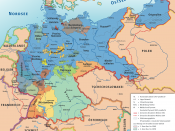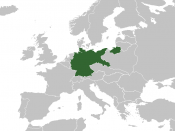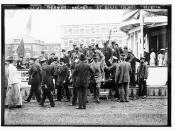1923 was one of the worst years for the Weimar Republic. During the first few years the Republic faced many crises. It was working in very difficult situations: trying to stabilize Germany; trying to rebuild the countryÃÂs infrastructure after the World War; and having to cope with the problems caused by the Treaty of Versailles. 1923 brought the French occupation of the Ruhr. The German reaction to this was passive resistance, which meant the workers in the Ruhr refused to work for the French. This led to the hyperinflation: Germany was not producing goods due to passive resistance and this meant it was getting poorer; because Germany was getting poorer, the government simply decided to print more notes so it would seem they were not achieving any loss; this directly caused the German hyperinflation. At the same time, the Weimar Republic was facing another crisis ÃÂ the Munich Putsch. When the Chancellor decided to drop the policy of passive resistance, the right-wingers were outraged and decided to plot a putsch against the government; the Nazis, encouraged by the Bavarian government attempted a revolution n Munich, but the army easily crushed this.
This became very difficult for the Weimar Republic because they felt they had to deal with these crises correctly, as otherwise the German public would begin to doubt the government even more than it was already, and this would result in many more putsches, revolutions and general chaos and disorder in Germany; as people were criticising and blaming the Weimar government for all these crises for signing the Treaty of Versailles. It was also a very difficult time for the republic, because it also had to admit to the public that it was wrong. The decision of passive resistance, with hindsight, obviously proved to be a drastic move as...



Well alright
Not bad... I enjoy History so that may be part of the reason why I like this. But For a topic such as this i think it needs more information. And this is just a little side note that doesn't really matter to much but your Title was incredibly boring and I probably wouldn't have read your essay if I wasn't a history fan. But your title does clearly state what your essay is about so I guess thats good.
1 out of 1 people found this comment useful.